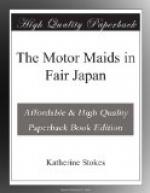“The storm at Nikko was mere child’s play to this; just an infant babe in arms,” answered Mary, weeping softly while she worked.
It seemed better to be doing something than to sit still and listen to the terrifying fury of the tempest, as again and again it hurled itself against the house.
“It wouldn’t have done any good even if we had caught the thief or spy or whatever he is,” observed Billie after a while. “There would have been no one to help us.”
Suddenly Mary’s perturbed mind harked back to what had happened in the hall.
“Billie,” she cried, “it wasn’t a man; it was a woman. That skirt I caught—that—that something—where is it?”
“What are you talking about, Mary?”
“I tell you I caught hold of something. It came off in my hands.”
She ran into the hall and, groping about on the floor, presently found what seemed to be a long coat. Rushing back she spread it on the desk. Billie held the candle high and the two girls stood gazing at it for some moments without speaking. Then Billie slowly placed the candle on the desk and sat down.
“I don’t understand, Billie,” said Mary, clasping and unclasping her hands in her excitement and surprise, “it’s Nancy’s blue raincoat, but—but I don’t understand.”
Billie covered her eyes with one hand as if she would like to hide from Mary what they might tell of her feelings and thoughts. There was nothing to say. It was Nancy’s blue raincoat, but she refused to think what the explanation might be.
After a long time, it seemed, O’Haru came into the room. She was amazed to find the girls in the library until they explained how they had just escaped the storm.
“Oh, much terrible,” ejaculated the housekeeper. “Much terrible more worse than since,” from which they gathered that it was one of the worst storms ever seen in Tokyo. O’Haru brought in lights and presently returned at the head of a procession of maids with trays of food; though whether it was luncheon or supper time it was impossible to tell. The clocks had all stopped in the earthquake and it was still as black as night. It might have been midnight or midday for all they knew.
The girls preferred to remain in the library, which seemed to them more protection than the other rooms, and O’Haru drew up three tables and arranged the trays with great deftness and celerity.
“Papa didn’t come?” asked Billie, noticing the third table.
“No, honorable lady.”
“For whom is the other tray, then?”
“Mees Brown,” answered O’Haru, rather surprised.
“But she is in the mountains,” said Billie, growing very red and uneasy. “Oh, Nancy, Nancy,” she groaned inwardly, “could it have really been you and are you out there in the typhoon?”
“Pardon grant,” said O’Haru. “Mees Brown arriving at morning. Mees Brown within.”
“I think not, O’Haru,” said Billie.




